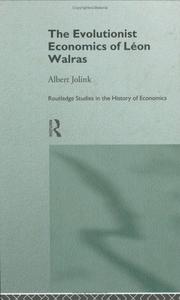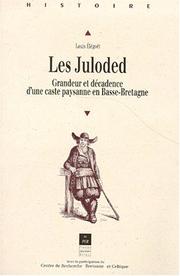| Listing 1 - 10 of 62 | << page >> |
Sort by
|
Book
Year: 1985 Publisher: Paris : Editions de la Sorbonne,
Abstract | Keywords | Export | Availability | Bookmark
 Loading...
Loading...Choose an application
- Reference Manager
- EndNote
- RefWorks (Direct export to RefWorks)
Noël, Léon, --- Poland --- History

ISBN: 0415098246 0415756308 1134961707 1280115599 0203979524 9780203979525 9786610115594 6610115591 9780415098243 9781134961702 9781280115592 9781134961658 9781134961696 9780415756303 Year: 1996 Publisher: London Routledge
Abstract | Keywords | Export | Availability | Bookmark
 Loading...
Loading...Choose an application
- Reference Manager
- EndNote
- RefWorks (Direct export to RefWorks)
This study offers a new perspective of Walras' pure, applied and social economics. Through archival research at the University of Lausanne, Jolink considers Walras' ideas on philosophy and philosophy of science based on a newly constructed taxonomy. Walras' work is placed in a broader context by stressing the nineteenth century cultural and historical background in which he lived. This further gives an insight into the relationship between the romanticism of the early nineteenth century and logical positivism of the twentieth century.
Walras, Léon --- Evolutionary economics. --- Walras, Léon, --- Walras, Marie Esprit Léon, --- Economics --- Walras, Leon,
Book
ISBN: 2753596174 Year: 2023 Publisher: Presses universitaires de Rennes
Abstract | Keywords | Export | Availability | Bookmark
 Loading...
Loading...Choose an application
- Reference Manager
- EndNote
- RefWorks (Direct export to RefWorks)
"Quels rapports ont entretenu l'idéal républicain et la science économique tout au long du XIXe siècle, sur fond de révolution industrielle ? Cet idéal est-il uniquement politique ou implique-t-il de donner aux rapports économiques et sociaux une forme spécifiquement républicaine ? Doit-il nécessairement se soumettre au fonctionnement autonome de l'économie, marque des sociétés modernes ? N'est-il pas porteur d'exigences propres, de principes et de valeurs ? Ces derniers n'invitent-ils pas au contraire à façonner les rapports économiques autrement qu'ils ne l'ont été dans l'histoire récente du capitalisme ? Retracer la trajectoire intellectuelle de l'économiste Léon Walras - ardent républicain et démocrate, considéré aujourd'hui comme le père fondateur de l'économie scientifique, théoricien de la concurrence pure et parfaite et de l'équilibre général des marchés - permet de répondre à ces questions. Ce livre cherche à comprendre la pensée économique de Léon Walras à l'aune, non plus de l'histoire de l'analyse économique, mais de celle du républicanisme. L'idée d'un marché juste parce que méritocratique est la principale contribution de Walras au républicanisme français après l'échec de la Révolution de 1848. Égalité des conditions, inégalités des positions, telle est la formule qu'il a défendue et dans laquelle est encore enfermé notre imaginaire social républicain. Encore faut-il en éclairer la genèse afin d'en comprendre les limites."--Page 4 of cover.
Economics --- Sociological aspects. --- Political aspects --- Walras, Léon,

ISBN: 2868471943 2753525544 Year: 1996 Publisher: Presses universitaires de Rennes
Abstract | Keywords | Export | Availability | Bookmark
 Loading...
Loading...Choose an application
- Reference Manager
- EndNote
- RefWorks (Direct export to RefWorks)
Attestés dès le XVe siècle, les Juloded étaient des paysans-tanneurs et, surtout, des paysans-marchands de toile qui formèrent, dans le Léon, un groupe social original jusqu'aux approches de la Seconde Guerre mondiale. Ils étaient généralement alphabétisés, riches au point de se dispenser de travailler de leurs mains, sûrs d'eux-mêmes et constamment aux postes de commande de leur paroisse ou commune. Leur originalité était telle qu'ils constituaient une caste. Si leur apogée se situe vers 1680, ils étaient encore un demi-millier au début du XIXe siècle. C'est la Révolution industrielle qui eut raison de leurs activités artisanales et marchandes. Réfractaire à la ville, cette aristocratie paysanne ne suscita guère d'entreprises industrielles et commerciales d'envergure pour remplacer ses activités ancestrales, frappées de mort lente.
Léon (France) --- Rural conditions. --- Pays de Léon (France) --- vie rurale --- groupe social --- aristocratie paysanne --- histoire rurale --- histoire de France --- histoire régionale --- marchand --- commerce --- paysannerie
Book
ISBN: 1282029754 9786612029752 1443802190 9781443802192 1443801771 9781443801775 Year: 2009 Publisher: Newcastle upon Tyne : Cambridge Scholars Pub.,
Abstract | Keywords | Export | Availability | Bookmark
 Loading...
Loading...Choose an application
- Reference Manager
- EndNote
- RefWorks (Direct export to RefWorks)
La Bayadère was first produced at the Maryinsky Theatre, St Petersburg, on 4 February 1877. The scenario was by Sergei Khudekov and Marius Petipa, who also devised the choreography. The music was by the Austrian composer Ludwig Minkus (1827-1917), who spend most of his life working for the Imperial Ballet in St Petersburg. His music for this ballet-long scorned, never published, and endlessly re-arranged- has slowly emerged, since its revival began in the West in the 1960s, as a viable and si...
Ballets --- Music --- Minkus, L., --- Minkus, Léon, --- Minkus, Ludwig, --- Minkus, Léon Fyodorovich, --- Minkus, Alois, --- Minkus, Aloysius Ludwig, --- Minkus, Li︠u︡dvig, --- Minkous, Louis, --- Mincous, L.
Book
ISBN: 9004427031 900442704X Year: 2021 Publisher: Boston : BRILL,
Abstract | Keywords | Export | Availability | Bookmark
 Loading...
Loading...Choose an application
- Reference Manager
- EndNote
- RefWorks (Direct export to RefWorks)
"This is the first-time publication of long-lost letters by a crucial figure in modernist publishing. Carefully edited and extensively contextualised, they document Beach's unwavering, all-embracing support for Joyce's art by publishing his controversial Ulysses in Paris in 1922 and other efforts such as getting fragments of Work in Progress published. They also reveal her difficulties with his uncompromising and demanding personality, as it is vividly illustrated in the Frankfurter Zeitung affair. The edition moreover includes all extant letters to Paul Léon, her successor after their break-up following severe disagreements over the American edition of Ulysses. Joyceans and scholars of modernism will find this an indispensable resource for further research"--
Publishers and publishing --- Booksellers and bookselling --- Beach, Sylvia --- Joyce, James, --- Joyce, James, --- Léon, Paul L.
Book
Year: 2015 Publisher: New Haven, [Connecticut] ; London, [England] : Yale University Press,
Abstract | Keywords | Export | Availability | Bookmark
 Loading...
Loading...Choose an application
- Reference Manager
- EndNote
- RefWorks (Direct export to RefWorks)
A new appreciation of the extraordinary life and legacy of Léon Blum, the first Jewish prime minister of France Léon Blum (1872–1950), France’s prime minister three times, socialist activist, and courageous opponent of the pro-Nazi Vichy regime, profoundly altered French society. It is Blum who is responsible for France’s forty-hour week and its paid holidays, which were among the many reforms he championed as a deputy and as prime minister, while acting as a proudly visible Jew, a Zionist, and eventually a survivor of Buchenwald. This biography fully integrates Blum’s Jewish commitments into the larger story of his life. Unlike previous biographies that downplay the significance of Blum’s Jewish heritage on his progressive politics, Pierre Birnbaum’s portrait depicts an extraordinary man whose political convictions were shaped and driven by his cultural background. The author powerfully demonstrates how Blum’s Jewishness was central to his outlook and mission, from his earliest entry into the political arena in reaction to the Dreyfus Affair, and how it sustained and motivated him throughout the remainder of his life. Birnbaum’s Léon Blum is a critical chapter in the larger history of Jews in France.
Statesmen --- Socialists --- Blum, Léon, --- Front populaire. --- France --- Politics and government
Book
Abstract | Keywords | Export | Availability | Bookmark
 Loading...
Loading...Choose an application
- Reference Manager
- EndNote
- RefWorks (Direct export to RefWorks)
L'étude porte sur les familles ayant vécu dans le village de Saint-Léon-sur-l'Isle, entre 1780 et 1839. Une lecture très fine des sources, notamment des actes notariés, met en évidence les logiques de comportement et leur évolution pendant une période de bouleversements qui malmènent les équilibres familiaux.
Families. --- 1700-1899 --- Saint-Léon-sur-l'Isle (France) --- Social life and customs
Book
ISBN: 9401210713 9789401210713 1306738539 9781306738538 9789042038264 9042038268 Year: 2014 Publisher: Amsterdam Editions Rodopi
Abstract | Keywords | Export | Availability | Bookmark
 Loading...
Loading...Choose an application
- Reference Manager
- EndNote
- RefWorks (Direct export to RefWorks)
Rethinking Négritude through Léon-Gontran Damas analyses four cases in which Damasian Négritude shifted through generic experimentation: Pigments (1937), Retour de Guyane (1938), Veillées noires (1943) and Black-Label (1956). In doing so, it also advances scholarship on Damas (1912–1978) in two ways. On the one hand, it undertakes the crucial and in-depth research needed to challenge the understanding of Négritude as a bipartite (Césaire and Senghor) phenomenon. On the other hand, it offers an innovative reading of Damas whose work deserves more complete consideration than it has received thus far. Reading this essay will illuminate Damas’s works and their relationship to one another, thus demonstrating the continuity of Damasian Négritude.
Negritude (Literary movement) --- Literary movements --- Literature, Modern --- History and criticism --- Damas, Léon-Gontran, --- Damas, L.-G. --- Gontran Damas, Léon-, --- Criticism and interpretation. --- Literature --- Belles-lettres --- Western literature (Western countries) --- World literature --- Philology --- Authors --- Authorship --- History and criticism.
Book
ISBN: 1280669209 9786613646132 9814307823 9789814307826 9781280669200 9814307815 9789814307819 661364613X Year: 2012 Publisher: Singapore World Scientific
Abstract | Keywords | Export | Availability | Bookmark
 Loading...
Loading...Choose an application
- Reference Manager
- EndNote
- RefWorks (Direct export to RefWorks)
Léon Rosenfeld (1904-1974) was a remarkable, many-sided physicist of exceptional erudition. He was at the center of modern physics and was well-known as Niels Bohr's close collaborator and spokesman. Besides he reflected deeply on the history and philosophy of science and its social role from a leftist perspective. As both actor and acute spectator of modern physics and as a polyglot cosmopolitan whose life crossed those of many important people in both the East and West, as well as by virtue of his close collaboration and friendship with Bohr, Rosenfeld was an important figure in twentieth ce
Physicists --- Physics --- Science --- Science and society --- Sociology of science --- Philosophy. --- Social aspects. --- Rosenfeld, L. --- Rosenfeld, Léon,
| Listing 1 - 10 of 62 | << page >> |
Sort by
|

 Search
Search Feedback
Feedback About UniCat
About UniCat  Help
Help News
News